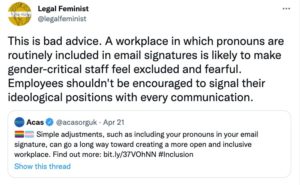
Do Employees Have To Use Gender Pronouns In Email Signatures?
Background
Gender pronouns refer to the person you are addressing. They include he/him/his, she/her/hers and they/them. Most people assign someone a pronoun based on their exterior appearance, on how they dress themselves etc. However, some people may choose a different pronoun than what their outward appearance may suggest. Under the Equality Act (EA) 2010, there are nine protected characteristics including; age, sex, disability, gender reassignment, marriage and civil partnership, pregnancy and maternity, race and religion or belief.
In the workplace, some people may choose to include their preferred pronouns in their email signatures or letters. Accompanying this, some companies may make it company policy for every one of their members to include their preferred pronouns at the start of their emails or in the title of their emails.
An employment contract lists all the terms and conditions of a new employee working there. These terms and conditions are binding, and once signed and agreed, the employee cannot breach them and has to follow them.
What is more, a company policy lays out the behaviour expectant of an employee. A company policy is company wide and binding upon all its members.
The terms of a contract are negotiable and thus can be altered. Alternatively, a company policy cannot be changed by its respective members. A company policy is binding and unchangeable, unless you have a senior position in the company, as soon as you become a member of the company.
Discussion area
As mentioned earlier, company policy rules are binding upon all its members.
A question can then be put forward on whether a company member has to follow a specific company policy that contravenes and breaches their own morals and belief system. For example, whether an individual should have to include their pronouns when they do not want to or if it is against their belief system, even though this is company policy.
On top of this, two different viewpoints come into play when discussing pronouns. Firstly, there is sex denialism, which argues that gender does not matter and that instead it depends and is constructed by your own identity. This viewpoint would be for everyone putting gender pronouns in their emails. On the other hand, there are gender criticals who believe that biological sex does matter in certain context. They see that it matters for safeguarding, security and fairness in sport purposes. Thus, they would argue that you do not have to put gender pronouns in the title of your emails.
In addition, the case of Maya Forstator v GCD Europe and others (2021) can be added. This case is concerned with the claimant, Maya Forstater’s gender critical viewpoint. Author JK Rowling supported Maya Forstater on her view. The claimant made statements including “woman means adult human female” and “trans women are male”. The claimant believed that the statements just listed are not expressions of antipathy towards trans people or “transphobic”, but rather are statements of neutral fact. She also argued that “my belief is that sex is real and immutable. I haven’t expressed an opinion on gender”. The Tribunal in the original case, stated that the Claimant’s belief was not protected under the Equality Act 2010 as they were “not worthy of respect in a democratic society”. Conversely, the claimant appealed and the appeal was upheld by the Employment Appeal Tribunal (EAT).
In the judgement in the EAT, they gave a list to clarify what the judgement did not do or promote. The EAT stated that the judgement in no way gave an opinion or standing on the transgender debate. The EAT also clearly conferred that the judgement given does not mean any person can misgender transgender persons with impunity. Purity of intention is important here, individuals have to try their best to use the correct pronouns, when told. Moreover, the EAT confirmed that people are still protected from harassment and discrimination under the EA. Lastly, that the judgement does not mean employers and service providers will not be able to provide a safe environment for a transgender person. This case connotes that the gender critical viewpoint was upheld here whilst still confirming that the protection of transgender individuals in the workplace is crucial, utilising the EA.
Moreover, as seen below, The Advisory, Conciliation and Arbitration Service (acas) tweeted on social media advising people to add in their pronouns in their email signature.

The blog ‘Legal feminist’ replied against this statement by acas, stating it can lead certain staff to feel alienated due to their gender critical viewpoint. Alternatively, some individuals should not be coerced into including their gender pronouns in their email signatures.
It can be argued that having every employee provide their preferred gender pronouns in your email title could also expose certain individuals to preconceived prejudiced notions of them. These preconceived notions being high or low standards and expectations of them based on their gender.
Further, the very famous and highly publicised case of Lee v Ashers Baking Company Ltd and others (2018) brought more freedom of expression rights. Especially as it was in the Supreme Court, it has given more authority. This case concerned two Christian baker owners in Belfast, who appealed against a court decision claim. This claim being that they discriminated against a customer due to refusing to decorate a cake with the phrase ‘Support Gay Marriage’. The couple won their appeal, on the basis that the judge stated that the couple were simply not discriminating against them based on their sexual orientation. That the couple were not discriminating at all. This is because they were not refusing to bake the customer a cake based on their sexual orientation, but based on what the slogan represented, contrary to the baker’s own opinion.
Also, into the bargain, Peter Tatchell, for ‘i news’ commented on the Lee v Ashers Baking Company Ltd and others judgement. He stated that “this verdict is a victory for freedom of expression […] it also means that gay bakers cannot be compelled by law to decorate cakes with anti-gay marriage slogans”. This cake case denotes that discrimination does take the form of refusing customers based on one of their protected characteristics (EA).
An argument can be put forward that refusing to include your pronouns in your email signature is not discrimination, but rather freedom of speech. If they are for the gender critical argument then this would support this. Consequently, the same can be applied to the question at stake here. Individuals can refuse to include their own gender pronouns in their email signature if it goes against their own viewpoints. By contrast, other individuals could choose to include their pronouns if it supports their viewpoint. Upholding freedom of speech should be the most paramount consideration.
Concluding thoughts
It can be concluded that if a company policy goes against the individuals’ beliefs and views then that individual should not have to follow this company policy. An individual should not have to undermine their own beliefs.
Both the gender critical viewpoint and sex denialism viewpoint have been put forward. Taking a gender critical viewpoint, it would be argued that individuals should not be forced, under company policy or any other rule base, to put their pronouns in their emails due to security and safeguarding for certain individuals. Also, due to freedom of speech if it contravenes their own viewpoint to include their pronouns in their email. On the contrary, sex denialism portrayed the view that sex does not matter as it is constructed and thus everyone should be entitled to put their gender pronouns in their emails.
Overall, it can be stated that no matter what your viewpoint is, individuals should have the autonomy and choice on whether they want to include their pronouns in their email signature or not. It can be added that the choice they make on this should not lead people to discriminate against them. The workplace should aim to create a safe work environment, by fairly juggling freedom of speech and also protection from discrimination and harassment, which is protected under the Equality Act 2010 and the Protection from Harassment Act 1997.
Employers should ensure that company policies given are clear and staff training is provided. Whilst employees should not be treated unfairly because of their beliefs, if these beliefs are manifested in a way that is offensive or amounts to harassment then disciplinary action may be taken.
Article written by Hannah Claxton
This article is intended for general information only, applies to the law at the time of publication, is not specific to the facts of your case and is not intended to be a replacement for legal advice. It is recommended that specific professional advice is sought before relying on any of the information given. © Jonathan Lea Limited.
